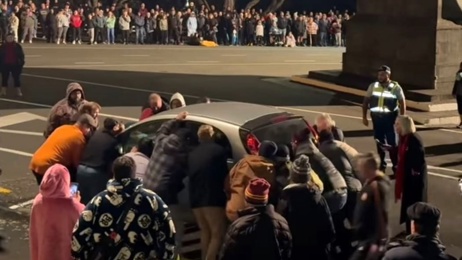Nelson Mayor Rachel Reese has declared a state of emergency after the Maitai river in Nelson East breached its banks as heavy rain continues to sweep across the South Island.
Earlier this afternoon seventy homes in Nelson were being evacuated, and Nelson Tasman Civil Defence is now urging any residents still in their homes near the river from the Nile St Bridge to the Golf Course to evacuate immediately.
Tasman District Police are advising motorists to limit their travel to essential travel only, as the current severe weather event has closed several roads in the region with more closures likely.
Mayor Reese says there are preparations underway to look after people who need to leave their homes and there will be trained people on hand to offer support.
"If people have no safe place to go, they should head to the Saxton Stadium where they will be able to gain assistance."
Earlier this afternoon, a voluntary evacuation order was announced for parts of Westport, Seddonville and Mokihinui.
At a media conference, Buller Emergency Management Controller Al Lawn and Buller Deputy Mayor Sharon Roche said it was a precautionary measure.
"We would rather take a precautionary approach ... rather than knock on doors at 2 or 3 in the morning," Lawn said.
Roche said the West Coast was well prepared after several flooding incidents in recent months.
"This is not unusual or new to us."
About 140 households in three areas were being asked to voluntarily evacuate.
Heavy rain has been beating down on the South Island today.
It has prompted weather authorities to issue a "red warning" and Civil Defence to declare a State of Emergency for the South Island's battered West Coast region.
Westport residents in low-lying areas that flooded in February this year are being advised that they should act today to lift valuables, make arrangements for their pets and be prepared to self-evacuate.
Buller Emergency Management's team said Westport residents in Forbes, Coates and the Gladstone St areas should especially self-evacuate based on updated forecasts and modelling.
"The Buller River is likely to peak in Westport tomorrow morning. As well, the tide will be slightly higher than it was in February," it said on its Facebook page.
"The combination of rainfall, river flows, tide and sea swell increase risk of surface flooding in areas that were affected at that time."
"As a precaution, we ask people to move in daylight to avoid the risk we would have to evacuate them in the dark, placing everyone including our emergency responders at risk."
It comes as Niwa has warned of a "48-hour deluge" for the northern and western South Island, where some locations could see two to four times their normal August monthly rainfall.
Severe gales are also expected in some areas, including Northland, which earned an orange warning from MetService. Gusts of up to 120km/h in exposed places are expected from 9am tomorrow.
MetService says heavy falls are already hitting the South Island's northern and western coasts.
The ranges northwest of Tasman have recorded 200-350mm already, while 100mm has fallen at Rai Valley in Marlborough, 230mm at Franz Josef on the West Coast and 125mm at Hokitika, it says.
Roads are becoming increasingly hazardous with coastal State Highway 6, Rocks Rd in Britannia Heights, Nelson, being closed due to a slip this morning, police said.
They're requesting motorists to "please take an alternate route".
There is also flooding elsewhere on SH6 between Hira and Rai Valley, Waka Kotahi NZTA said.
The road authorities also issued a warning for State Highway 60 Upper Takaka to Collingwood for surface flooding this morning, with motorists posting footage of the flooded roads.
The videos showed roads underwater, especially near bridges, with traffic signs poking out, as well as paddocks near houses inundated.
And Auckland Transport has already begun cancelling some Gulf Harbour ferry services tomorrow ahead of the foul weather.
Heavy rain warnings for Auckland and Northland
MetService has upgraded weather warnings for the upper North Island and has heavy rain warnings for Northland, Auckland and Great Barrier Island.
Between 110mm to 140mm of rain is forecast in Auckland and Great Barrier Island in the 28 hours from 10pm tonight until about 2am on Friday.
"Heavy rain may cause streams and rivers to rise rapidly. Surface flooding and slips are also possible and driving conditions may be hazardous," the weather authority said.
The same heavy rain warning is in place over Northland - for the 35 hours from 7pm tonight until 6am on Friday.
More rain is expected to fall over the region. Locals are told to prepare for between 150mm to 220mm of rain to accumulate, especially in the north and east.
Peak rates of 15mm to 25mm/h are on the cards tomorrow.
Buller Civil Defence Controller Al Lawn said people who had evacuated in the past knew the importance of having time to plan and prepare, so he urged them to take the initiative, consider their own circumstances and act today in case the situation deteriorated.
"We have done a lot of work to mitigate the effects of the rain and protect critical infrastructure, but we recommend that householders who were flooded in February this year look at their own situation and take action today," he said.
"We are constantly assessing the information on river levels and the impacts of the rainfall, and at this stage we are not requiring a general evacuation. But people need to be aware that there is a significant amount of rain still to fall and the situation could change."
Where possible, people who plan to self-evacuate should arrange to stay with family or friends.
Anxious and stressed residents have started preparing their homes with sandbags and other measures in the Buller district.
Buller district deputy mayor Sharon Roche told TVNZ's Breakfast: "At this stage, we're just asking residents to be prepared. A lot of them have already started to sandbag and ... prepare their homes.
"At this stage, there [is] no plan of evacuation. But obviously, if people feel safer by moving out to friends or family to higher ground, then absolutely we would encourage that."
Roche said surprisingly, there was not much rainfall overnight.
"There were times when there were some heavy showers, then other times when there was no rain at all."
Roche said one advantage authorities had was time. Extra pumps had been brought in, and extra support, and Roche said diggers were out working in critical spots known to flood in the past.
"We're well prepared - as prepared as we can be."
Roche said they were due to get a briefing and update on the situation some time this morning.
Asked how residents were feeling, Roche said: "People are anxious and stressed - there's no doubt about that."
That was particularly the case for those whose homes or properties had been badly damaged in previous weather events, she said.
Just before 2pm, Buller Emergency Management advised Westport residents in Orowaiti Overflow area (Snodgrass), as well as Forbes and Coates Sts and the Gladstone St area in Westport to self-evacuate today, based on updated forecasts and flood modelling.
It said the latest advice is that the flooding event won't be as intense as first thought but the Orowaiti Overflow area remained vulnerable
"Teams of Police, Defence Force, Fire Brigade and LandSAR volunteers will be going door-to-door this afternoon to make sure residents have received the message and to give them reassurance," it said on its Facebook.
"If you need help to evacuate or lift valuables, call 0800 234 533."
"Our welfare teams are setting up evacuation centres for those who are not able to arrange their own accommodation. People will be referred to those centres after being assessed by the Flood Recovery Hub. "
North of Westport in Sedonville and Mokihinui local welfare areas were also being activated due to the risk of river flows similar to or higher than those in February 2022.
The West Coast is one of the regions in line for the "atmospheric river" weather event, which one expert says could be more damaging than otherwise as it comes after an exceptionally wet winter.
Atmospheric rivers are large and extremely high plumes of moisture that move in the atmosphere from the tropics to the mid-latitudes, where New Zealand is located.
When they hit another weather event or New Zealand's mountainous terrain, vast amounts of water vapour is squeezed out, falling as heavy rain or snow, Niwa meteorologist Tristan Meyers said.
Experts say it is likely this weather event is influenced by climate change.
MetService issued the red warning - reserved for the most extreme weather events where significant disruption is expected - for Westland and Buller where up to 500mm and 550mm of rain is expected to accumulate, respectively.
Large parts of the rest of the country are also expected to get drenched by the extreme weather event - including Northland, Waikato, Taupō, the Tasman District, Marlborough and Mt Taranaki.
Meyers said two bursts of rain were expected, from Tuesday-Thursday and then again from Saturday-Sunday, affecting primarily the South Island.
"All up, over a month of rainfall could fall for large parts of the West Coast, Canterbury High Country, Tasman, Marlborough and Nelson.
"This will lead to slips, and possibly flooding for some South Island rivers."
It would also melt snow which could exacerbate riverine flooding in some areas, he said.
Meyers said heavy rain was also headed for parts of the North Island, particularly Northland, Taranaki and Bay of Plenty, with the most intense downfall expected on Wednesday.
University of Otago senior lecturer in geography Dr Daniel Kingston said although this specific weather event had not been analysed regarding the influence of climate change, it was "more than likely playing a role".
Average air temperature had warmed by slightly more than 1C over the past century and as the atmosphere warmed it could hold more moisture, increasing the likelihood for extreme heavy rainfall events such as this.
"Sea surface temperatures around New Zealand are also warmer than average right now, which can further amplify these sorts of events."
Kingston said this event could be more damaging because it comes on top of an already exceptionally wet winter.
July was the wettest on record while more than 40 locations have experienced record or near-record rainfall, he said.
"The ground is already very wet with limited capacity to absorb further rain."
- Additional reporting RNZ
Take your Radio, Podcasts and Music with you









